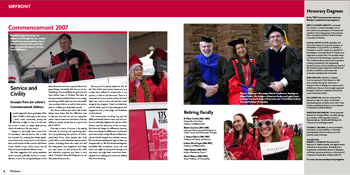SERVICE AND CIVILITY
 I would urge each of you graduates of the class of 2007 to find ways to also serve. I don’t mean necessarily joining the Marines, to fight in Iraq or in the next war or two. I mean, no matter what you decide to do with your life, also serve.?
I would urge each of you graduates of the class of 2007 to find ways to also serve. I don’t mean necessarily joining the Marines, to fight in Iraq or in the next war or two. I mean, no matter what you decide to do with your life, also serve.?
I happen to personally favor some form of mandatory national service. Not a draft, but a system for creating the shared experience of service for everyone, for us all. Service that could include civilian service—the Peace Corps, teacher corps, police corps, and all kinds of corps besides the Marine corps.
But that suggestion isn’t going anywhere at the moment politically. Service is a voluntary act, so be it. You are graduating at a time when there are enormous opportunities to do great things, voluntarily. But also to do terrible things. The possibilities for good and evil have seldom been so limitless. We have, at the personal and political levels in our society, wrenching conflicts right now over race, health care, poverty, violence, as well as how we employ our military and diplomatic muscle.
Yes, those conflicts and others like it have always been there. But the difference now is that we—you and me and our respective peers—have a chance to solve them. If we are willing to simply accept that as a given and get on with it.
One way to serve, of course, is by staying informed, by forming and expressing opinions, by questioning the opinions of others, particularly those other people who hold public office or who otherwise exercise public power—including those who write and edit the newspapers and magazines and blogs you read; report on and produce the radio and television programs you listen to and watch. Complain about the things you do not like, praise those you do.?
But as you do it, please, please be civil, be fair. One of the most serious losses we, as a society, have suffered in recent years in my opinion, is that of civil discourse. There is a meanness of communication alive in the land right now. I see it in the mail and the e-mail we get at our program. I hear it on television and the radio, read it in the newspapers and magazines and on the blogs and elsewhere on the Internet.
The controversies involving Iraq and the 2008 presidential election have and will continue to definitely heighten the passion of the rhetoric and the discourse at the moment. But there will always be differences because there must always be differences in a free and open democratic society. We are civilized people; we should disagree in a civilized manner. We should acknowledge the right of others to disagree with us. We should acknowledge the possibility that sometimes, some very rare times, we might be wrong. And strange as it may seem, we might learn more from listening than from talking, and more from talking than from shouting.
